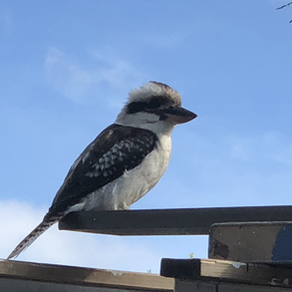RETURNING LEARNING
EXPLORING CHILDHOODNATURE THROUGH POSTHUMANISM


ABOUT
PhD Project
Recent world happenings have demonstrated the unrelenting power of nature through record-breaking flooding, bushfires, droughts, severe storm events, viral pandemics, amongst many others, resulting in unprecedented loss of human and nonhuman lives alike and leaving very few, if any, untouched.
The environment has been stretched beyond tipping point and the latest Organisation for Economic Co-operation and Development (OECD) and Australian Department of Education and Training (DET) reports signalling a desperate and urgent need for monumental changes to education systems, research that grounds posthuman concepts such as childhoodnature in environmental education is significant and timely. Moreover, research that explores emergent approaches including transqualitative inquiry using diffractive ethnographies propels environmental education into radical options for future possibilities.
RESEARCH QUESTIONS
OVERARCHING QUESTION
What are early school years teachers' perceptions of nature and how do they inform pedagogy?
SUBSIDIARY QUESTION 1
What are early school years teachers’ perceptions of nature?
SUBSIDIARY QUESTION 2
How are early school years teachers’ perceptions of nature and their pedagogy informed by the Australian Sustainability cross-curriculum priority?
THEORY
The ReTurning Learning Theoretical Framework

The ReTurning Learning theoretical framework espouses an entanglement of childhoodnature, material-discursive practices and affective atmospheres.
Illustration by Kelly @ Kelly Designs for the author.
Our meta/physics, like all good scientific theories, should be alive, responsible, and responsive to the world. How else will our theories matter? (Barad, 2011, p. 451)
Materialising from the entanglement of the three concepts of material-discursive practices, affective atmospheres, and childhoodnature is the ReTurning Learning theoretical framework that underpins this study. The ReTurning Learning theoretical framing provides a rigorous foundation for explaining everyday happenings and encounters where every body[1] matters. This is relevant to my study as in order to investigate early school years teachers’ perceptions of nature and how they inform pedagogy from a posthuman perspective, a relevant, meaningful and suitably aligned framework was necessary to provide the conceptual foundations to enable the work to happen. The triage of concepts are theoretically robust each in their own right in disrupting traditional binary-making practices, questioning human exceptionalism, and bringing attention to the mattering of every-thing particularly the agency of human/nonhuman nature, equally so. Together, their conceptual alignment in these matters, provided a fierce theoretical frame to materialise the data entanglements.
Although childhoodnature, affective atmospheres and material-discursive practices are fitting concepts to entangle data through this transqualitative study, the reliance on ‘naming’ that these concepts call for is acknowledged, and troubled (Murris & Haynes, 2018a). The use of language in describing these concepts and the data entanglements that are made is problematised, as for example, how one person describes an atmosphere might be different to another. It is extremely subjective and informed by and through the perspective of the viewer. While this may be considered a limitation in some research paradigms, it was embraced in this transqualitative inquiry to demonstrate the richness and depth of data entanglement that is possible when seen through the eyes of the researcher.
[1] A body here refers to any entity or material object. This could be an atom, a rock, a tree, a person or a building.
DIFFRACTION
Diffraction is a core concept to Barad’s agential realist framework and moreover, it is foundational to my study as it underpins this theory but also is the basis for my methodology.
Diffraction is a term borrowed from Physics to describe the pattern of overlapping waveforms that disturb a field. This is significant as posthumanist theories do create a disturbance and it is through those disturbances (like we can observe here in this image) that the data makes itself known.
Through the agential realist framework, diffraction denies any seperateness between entities (e.g. there is no distinct outside).
MATERIAL DISCOURSE
Material discourse primarily explains how matter makes itself felt – the social, historical, cultural, economic, natural, physical, geopolicital forces etc. that are important in understanding the entangled nature and process of materiality (Barad, 2007).
The process of understanding and (re)conceptualising discourse from materiality requires an understanding that discourse is not just “what is said” (p. 146) and does not only involve human conversations and representations.
These ideas of discourse just being human perpetuate humanism and do not fit the theoretical frame where all matter is entangled through the processes of material discourse.
ENTANGLEMENTS
Entanglements explain the way matter intra-acts. It is the meeting of material-discursive practices through their diffractive patterning that creates disturbances and these enactments cannot be separated or drawn apart but are part of material becoming.
Entanglements are not merely “the joining of separate entities” (Barad, 2007, p.ix) but deconstruct notions of the self, or ‘I’ by positioning the human as an assemblage with other (St Pierre, 2011).
“There is no longer a knowing (human) subject who acts and a passive (nonhuman) object that is acted upon: everything is ‘entangled’” (Snaza, Sonu, Truman & Zaliwska, 2016).
THEORY
Underpinning Posthuman Concepts




















